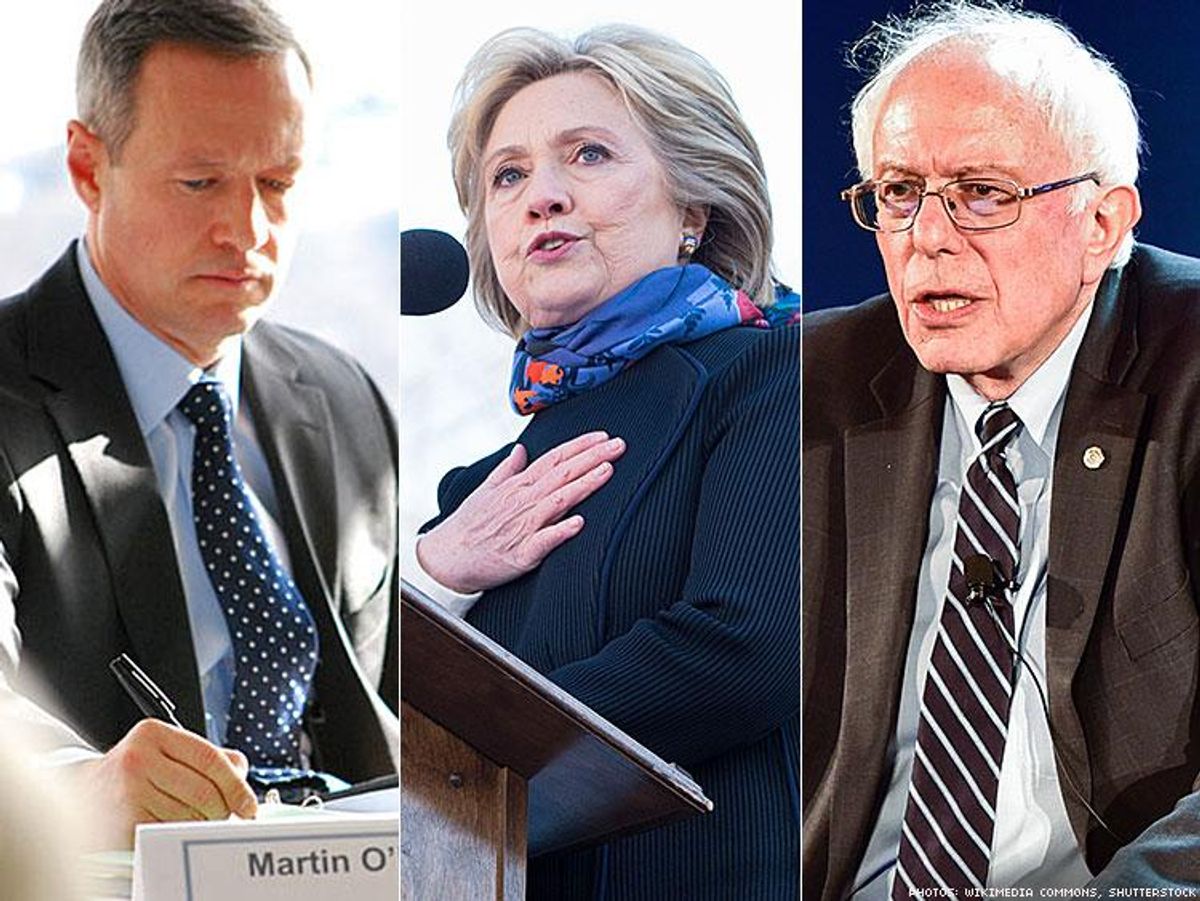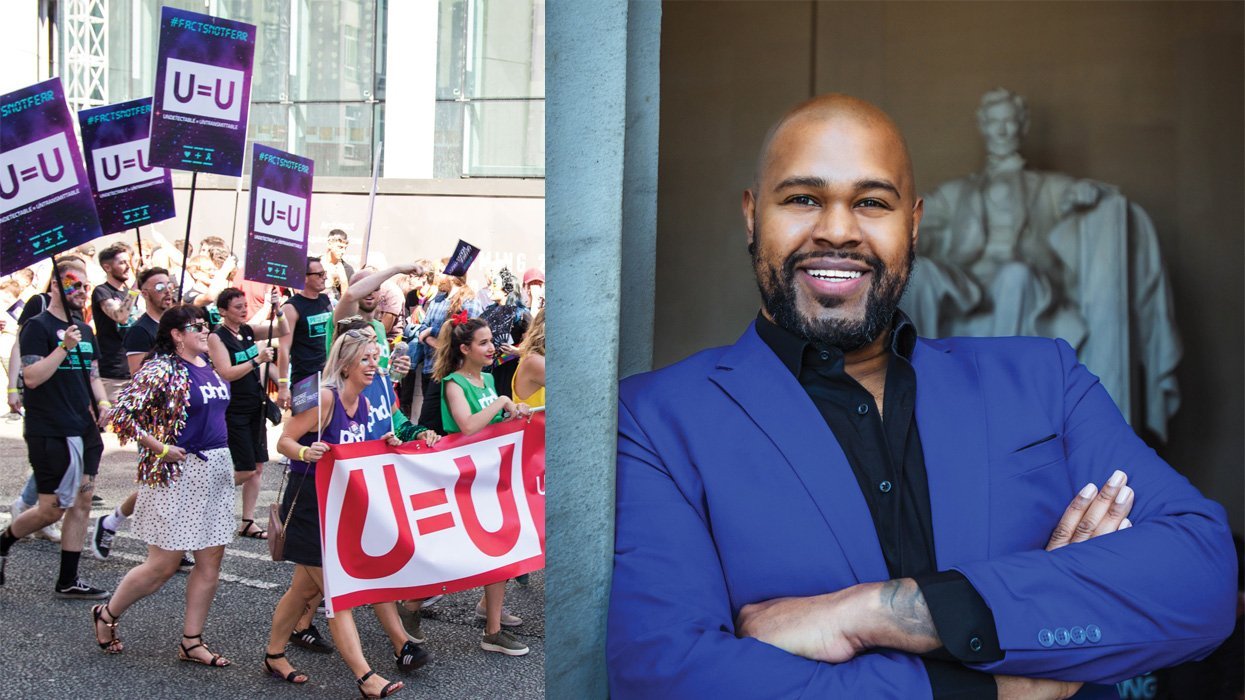With the election cycle in full swing, U.S. voters are tuning in to hear how the candidates plan to address the issues that matter to them most. For people living with or affected by HIV, there is much at stake when it comes to federal policy regarding access to care; discrimination based on HIV status, orientation, and gender identification; and the spread of scientifically-accurate information on a federal level. So the GMHC, one of the world’s first and most prominent HIV service organizations, took the candidates to task to find out just how he or she plans to govern on these issues.
GMHC sent all of the presidential candidates a 10-question survey on the various issues concerning HIV and AIDS in 2016. The organization said that the purpose wasn’t to endorse any one candidate, but to hear each candidates' policies on ending the epidemic and giving each of them equal opportunity to communicate these positions on HIV and AIDS to the public.
The campaigns were all informed of the deadline and that GMHC would publish their responses without any edits. At the time the survey was released, there were 18 candidates running; today only 16 candidates remain. Of these 16, only three candidates — all Democrats — submitted responses: Hillary Clinton, Martin O'Malley, and Bernard Sanders.
GMHC did not receive responses from the following Republican candidates: Jeb Bush, Ben Carson, Chris Christie, Ted Cruz, Carly Fiorina, Jim Gillmore, Mike Huckabee, John Kasich, Paul Rand, Marco Rubio, Rick Santorum, Jill Stein, and Donald Trump.
"While we are extremely disappointed that not a single Republican candidate submitted a response to the presidential survey on HIV and AIDS, we are heartened that those who did respond have thoughtful plans on how we end the epidemic," said GMHC CEO Kelsey Louie. "With 50,000 new infections across the country every year, voters deserve to know where every candidate stands on policies relating to the epidemic. Many debates have taken place, and not one moderator asked about HIV and AIDS, which is why GMHC decided to release this survey. GMHC will continue to work tirelessly throughout the 2016 election cycle to ensure HIV and AIDS prevention, care and advocacy is a priority for any serious contender running for office."
The GMHC Presidential survey began with the following question:
Over the last 30 years, GMHC has seen encouraging results when all levels of government, medical providers, and community-based organizations implement culturally competent, LGBT-inclusive sexual education and outreach that includes scientifically accurate information about HIV and AIDS. If elected, how will you direct your administration to continue and grow these best practices?
Here are the Democratic presidential candidates answers:
“Providing culturally competent care with access to a full range of necessary services is essential to quality and outcomes. On my watch as Governor, Maryland expanded Medicaid coverage for transgender individuals.
As President, I will direct agencies to incorporate the best practices of culturally competent care for the LGBT community into the national quality framework.”
- Governor Martin O’Malley
“While the United States has made great progress in the prevention and treatment of HIV and AIDS, our job as a nation is not yet finished. Most people can live long, healthy lives with HIV if they are diagnosed and get consistent treatment—but there are still too many barriers to accessing affordable care for HIV and AIDS. At the State Department, I worked with experts across the government and the private sector plan to reach an AIDS-free generation. As President, I will continue to drive towards that goal. I will call on Republican governors to extend Medicaid coverage to provide life- saving health care to people living with HIV. I will hold the pharmaceutical industry accountable and require health insurance plans to cap covered out-of-pocket prescription drug costs at $250. I will allow Medicare to negotiate lower drug prices and will stop direct-to-consumer advertising subsidies for drug companies—reinvesting those funds in research. And while we work to diagnose and treat all Americans with HIV and AIDS, we also must work to prevent exposure. I have long supported comprehensive, medically accurate sex education programs, and would continue to support such e orts as President. I will also increase our investment in HIV prevention medications, including pre-exposure prophylaxis (PrEP), to ensure populations at greatest risk of infection have access to the drug."
- Senator Hillary Clinton
“We should continue and expand the policies that are working. The United States has clearly come a long way in its attitudes towards sexual orientation, gender identity, and health status, but there is still a long way to go. We must ensure that health providers, social services, law enforcement, and all other entities have proper resources and training to handle the varying needs of the community they serve. Schools must be giving students age-appropriate, comprehensive sex education. I echo the NHAS’ recommendation that all Americans should have access to scientifically accurate information regarding HIV infection."
- Senator Bernie Sanders
To read the rest of the GMHC Presidential Survey, visit here.

















































































